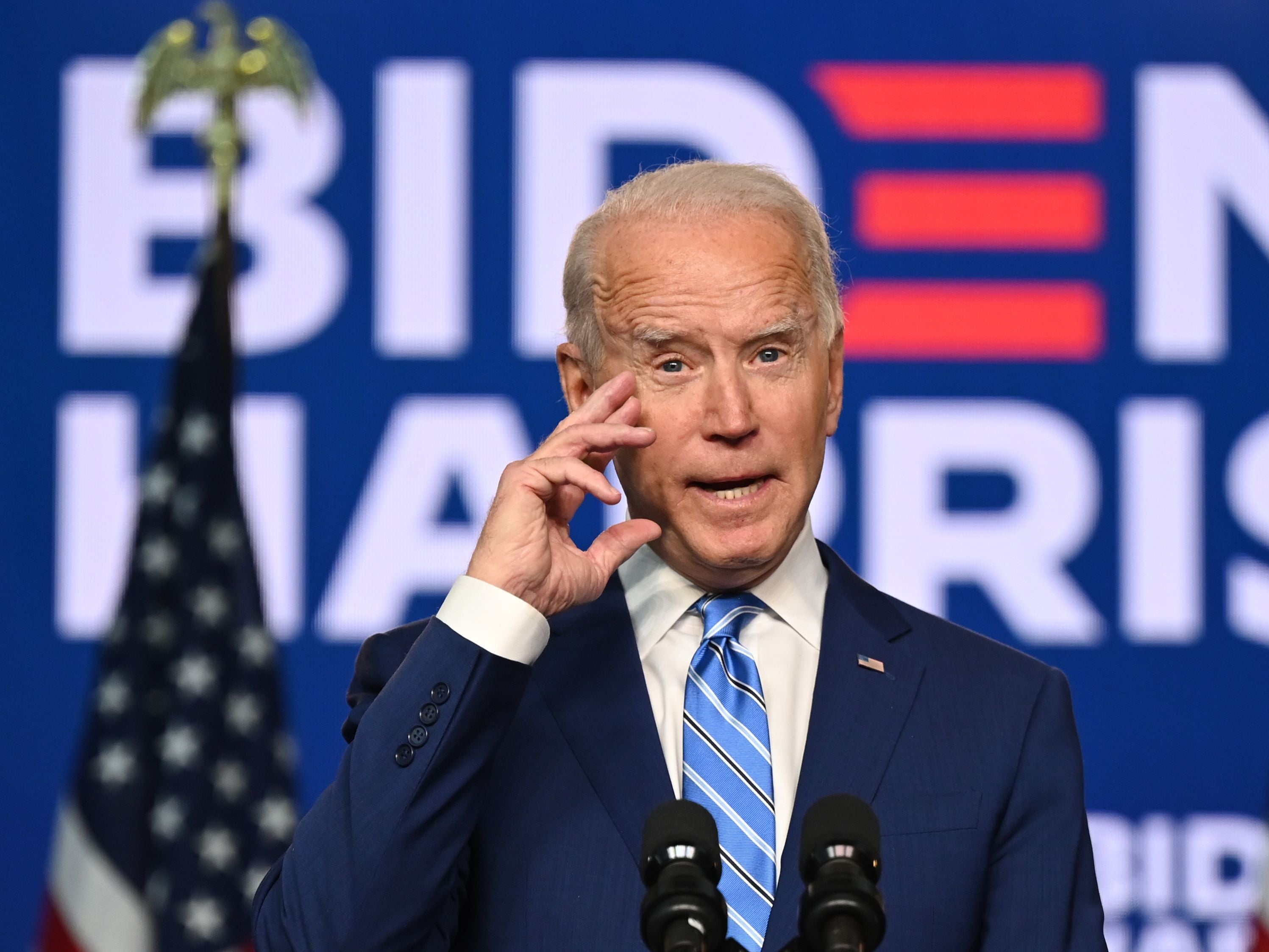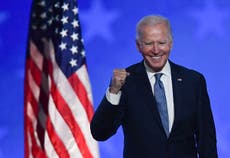Even if Biden wins, he will likely face a struggle against a divided Congress
The Democratic Party will probably face a Republican-led Senate looking to stymy the president’s agenda, writes Kim Sengupta


Joe Biden has had the most votes cast for him than any presidential candidate in American history, beating the previous record held by Barack Obama, and three and half million more, so far, than Donald Trump.
But numbers are going to be a problem for Biden, if and when he gets to the White House – as they were for Obama – in one crucial place, Congress. The Democrats have failed to fulfil expectations that they would take control of the Senate in the election to go with their majority in the House of Representatives.
Instead of increasing their seats in the House, as had been predicted, six seats have been taken by the Republicans. Nancy Pelosi, if she is re-elected speaker, may end up with the smallest Democrat majority in her four terms as House leader with all the constraints that brings.
In the Senate well-funded and energetic campaigns by Democrats aimed at unseating prominent Republicans, like majority leader Mitch McConnell and Trump loyalist Lindsey Graham, have largely failed.
At this moment the two sides are tied in the Senate at 48 each. It is possible that the Democrats can win two more seats, with run-offs potentially coming. But senator-elect John Hickenlooper, who beat the Republican Cory Gardner in Colorado, summed up the mood to MSNBC “ I was hoping that we would sweep to victory with a number of Senate wins. We’re still cautiously optimistic, but it is not the level of excitement I was hoping to wake up to.”
If the Republicans hang on to the Senate, then Biden will be the first Democrat president since Grover Cleveland in 1885 beginning his presidency without control of both the House and the Senate. And this will happen in the aftermath of a presidency which has left a bitterly polarised political landscape.
McConnell will become the most senior Republican in Washington, with significant power over the potential success of a Biden presidency – as the country tries to cope with devastating health and economic crisis and the fractured society left by Donald Trump.
One will have to see whether McConnell will be cooperate with a Biden administration. Past record suggest otherwise. Barack Obama and his vice president, Biden, both know obstructions that McConnell can throw up only too well.
Obama took over as president in 2009 after another economic meltdown. He wanted to go forward, he stressed, with a bipartisan approach to solving the pressing problems. However McConnell, then minority Senate leader, refused cooperation on a number of key issues , slowing down legislative action and hampering the recovery.
This was deliberate strategy. As McConnell told the National Journal at the time: “The single most important thing we want to achieve is for President Obama to be a one-term president". That was echoed by fellow Republican John Boehner in the House who said of Obama’s plans: “We are going to do everything – and I mean everything we can do --- to kill it, stop it, slow it down, whatever we can.”
Obama continued to make public appeals for working together. In one speech he said: “I hope that my friends on the other side of the aisle are going to change their minds going forward, because putting the American people back to work, boosting our small businesses, rebuilding the economic security are big national challenges... And it’s not going to be enough just to play politics. You can’t just focus on the next election. You have got to focus on the next generation.”
McConnell was convinced that the public would and blame the Obama administration, rather than Republicans in Congress, for the slow economic recovery. And he was proved right: in the 2010 elections the Republicans made huge gains in Congress, taking the Senate and the House.
Despite all the hindrance, Obama managed to accomplish many of his legislative aims, including passing the Affordable Care Act, by the time McConnell had become majority leader in the Senate in 2014. Now the Republican senator can aim at a Democrat administration from day one.
McConnell has been circumspect so far on the approach he will take. With Senate results still due to come in, he said after his re-election in Kentucky: “I don’t know whether I’m going to be the defensive coordinator or the offensive coordinator as we speak”.
Biden has run on one of the most progressive manifestos in recent American history and many in the Democratic party, which has shifted to the left in recent years, are hoping the administration could go further still.
Among the proposals mooted are an expansion of the Affordable Care Act, known as Obamacare, as well as taking the first steps on a Green New Deal, and rolling back the Trump tax cuts. There were proposals for granting statehood to the District of Columbia and Puerto Rico.
All of these will now be difficult to achieve.
Pelosi was so sure of Democrat gains in Congress that she had been discussing how to fulfil Biden’s programme including the possibility of using “budget reconciliation” to push legislation through without needing Republican vote. This had been used by the Democrats to pass Obamacare and the Trump administration used for their tax cut legislation.
“Budget reconciliation”, however, would only have been possible if the Democrats gained control of the Senate. The Democrat House Budget Committee chairman John Yarmouth has said: “ We all felt we had the possibility of being able to change the direction of the country. We had prepared a lot of memos on things like reconciliation that now we’re going to have to file away unless something crazy happens in the Senate.”
Biden will be able to push through some measures in the near future through executive action, as Obama and Trump had done. He is likely, for example, to revoke Trump’s immigration rules and restore funding for planned parenthood.
There will, of course, have to be some work done with a Republican Senate. Budgets will have to be agreed to keep government running, and many on both sides of Congress agree on more economic and healthcare spending needed because of the coronavirus pandemic.
McConnell had said that he was keen to see a stimulus package passed before the end of the year. He had also indicated that state and local aid – something the Democrats had been pushing for—could be part of the legislation.
Legislation was pushed through by the Obama administration through direct talks with McConnell and other Republican leaders. The negotiator for some of these was then-Vice President Biden.
We will have to wait and see whether a Biden administration would be able form a working relationship with Republicans in Congress.
However, the prevailing mood among Democrats seemed to have been summed up by Representative Gerald Connolly who told The Washington Post: “finding common ground after this election is going to be even more difficult, not less. We’ve got our work cut out for us, no question.”







Join our commenting forum
Join thought-provoking conversations, follow other Independent readers and see their replies
Comments